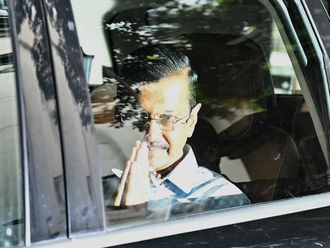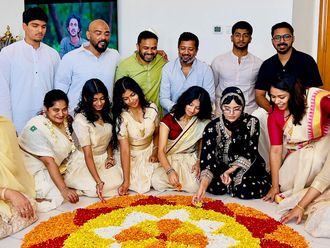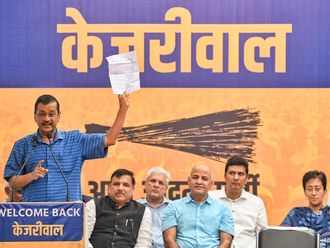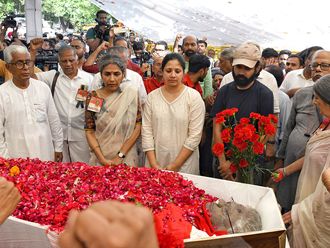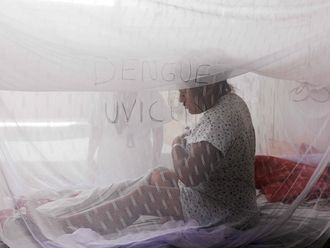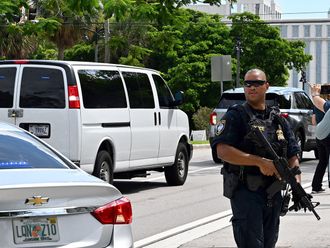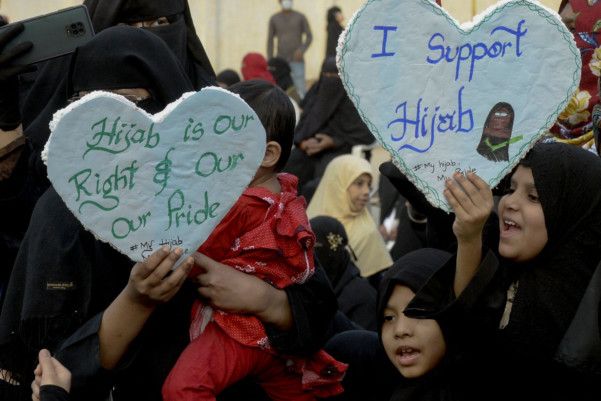
Bengaluru: The Karnataka High Court, hearing the hijab row, on Thursday ordered that no religious symbols are allowed in schools and colleges until its final order, thus ruling out use of both hijab and saffron shawls by students.
The interim order was given by a three-judge bench of Chief Justice Ritu Raj Awasthi, Justice Krishna S. Dixit, and Justice Khaji Jaibunnesa Mohiyuddin.
“We want to make an interim order on the matter of hijab row. We will hear the matter every day,” the Chief Justice stated.
Peace has to return to the state, and schools and colleges must open soon, the bench said, adjourning the matter to Monday.
Earlier, while hearing the arguments, the Chief Justice told Advocate General Prabhuling Navadagi to open schools in the state.
“Closure of schools is not a good development. Take necessary action and conduct classes. See to it that no problem surfaces,” he stated.
Amid tensions, the state government on Tuesday announced a three-day holiday for schools and colleges.
Court 'has no right to frame rules on uniform'
During the hearing, senior counsel Sanjay Hegde, appearing for a petitioner, submitted that the Karnataka government has no right to frame rules on uniform, as per the 1983 Karnataka Education Act.
The rules on uniform could be framed by the the College Development Committee (CDC) and School Development and Management Committee (SDMC), he maintained.
“How judicious it is to force prohibitions for the reason of hijab... if prohibitions are clamped for the public interest, it is tenable. The medical student was allowed to write examinations wearing hijab in 2015 as per the court orders. Wearing of dress comes under Article 19 (1) of the Constitution. The Supreme Court decision in the Divya Yadav case discussed the right to wear dresses of their choice,” he said.
As per Article 25 (1), wearing of hijab is a religious right. Sikhs are permitted to carry a dagger and are given exemptions from wearing helmets, he added.
“The girl students can’t be made to sit on roads. Karnataka state contributes highest taxes to the Central government. Most startups come up here and these developments will bring disrepute to the state. Discrimination should not be made on the basis of clothes, colour, and religion,” the counsel argued.
The petitioners arguing for hijab stated that there is no harm in students wearing it. Hijab is a fundamental right and it does not cause any problem to others, and so, they should be allowed to wear hijab of the same colour as their uniform, they said, arguing that the government has issued circular on uniform “hurriedly”.
The petitioners further stated that the bench should give an interim order on the issue in the students’ interests as students are outside schools. They also argued that as per the Karnataka Education Act, uniform is not compulsory for students and they only be fined Rs 25 for violating the uniform rules.
As Chief Justice Awasthi intervened here, asking whether the petitioner is saying uniform is not required, the petitioner submitted that as per act, it is not compulsory. It is okay for primary school students but uniforms for college students is being objected, he said.
Navadagi, however, opposed issue of an interim order on the issue and stated that there are various developments surrounding the issue.
Earlier, the single bench headed by Justice Dixit, which heard the matter, which has snowballed into a major crisis in the state and discussed at international levels, decided the matter to be heard by the larger bench. It directed the High Court Registrar to submit the documents and petitions immediately to the Chief Justice as the matter is of utmost importance and needs to be heard urgently.
The hijab row started last month with few students of Udupi Government Pre-University College wearing hijab being denied permission to attend classes. The college authorities maintain that the students who used to come without hijabs have suddenly started coming in hijab. The students later went on protest refusing to attend classes without hijab. The issue became a controversy and spread to other districts, leading to tension and even violence.
'Why should we jump in at this stage? It does not look nice'
Senior advocate Kapil Sibal mentioned the matter before a bench headed by Chief Justice N.V. Ramana, submitting it deals with what is happening in Karnataka, and is spreading in the entire country.
At this, the Chief Justice told Sibal that the Karnataka High Court is already examining the issue and it should be allowed to decide it. “Why should we jump in at this stage? It does not look nice,” he said.
As Sibal said the exams are just two months away and his client has filed the petition on Thursday, the Chief Justice reiterated that the high court be allowed to hear the matter first.
As he submitted that the top court could list the transfer petition and keep it pending, the bench said after the top court interferes in the matter, then the high court would never hear it saying the issue is pending before the apex court.
Sibal insisted that this issue needs to be considered, as schools and colleges are closed. The bench reiterated: “Let HC hear it first.”
Sibal pressed that he is only asking the top court to list the petition, and if the high court does not pass an order, then this court can transfer it to itself and hear it. After a brief hearing in the matter, the Chief Justice said: “We will see”.
The plea, filed by Udupi college student Fathima Bushra, said: “The said fundamental rights of the petitioner have been violated with impunity on one hand by the respondent No 2 which has denied entry to the petitioner into the college, thereby debarring her from attending her regular classes until the petitioner and similarly situated girls remove their headscarf/hijab.”
The plea added that the essentiality test, which is itself under re-consideration by a nine judge bench of the top court, is invoked where a competing right or state interest is involved and a balancing act is required by the court.
“It is submitted that a Muslim girl pursuing her education wearing a hijab/headscarf offends no right of any person and militates against no state interest. Therefore, even the essentiality test is wrongly invoked in the present facts,” the plea added.
The plea contended that the petitioner seeks to demonstrate that the Islamic practice of wearing a hijab/headscarf satisfies even this higher threshold of “essential religious practice”.
“It is clear that the attack on the Article 14, 19, 21 and 29 rights of the petitioner and other similarly situated Muslim girls is on account of their religion, which only exacerbates the infraction and amounts to reducing the secular character of the Constitution to a dead letter.”
The petitioner said segregating Muslim girls and forcing them to sit in a room other than their regular classroom, borders on the practice of “religious apartheid” and at the same time is also an affront to the equal protection clause in Article 14.


